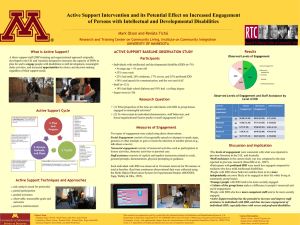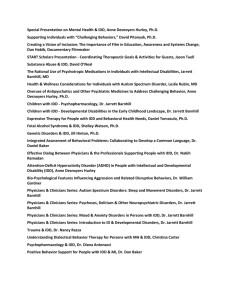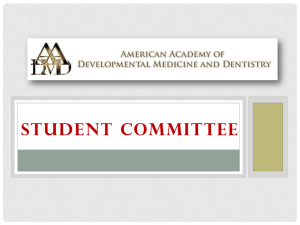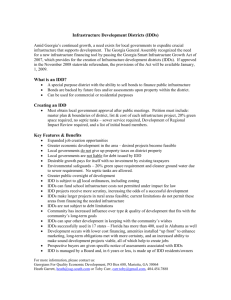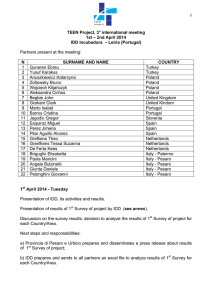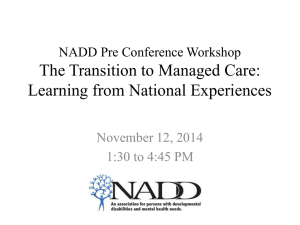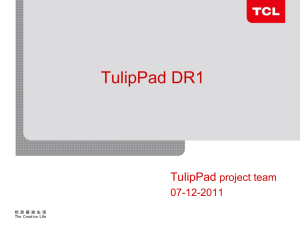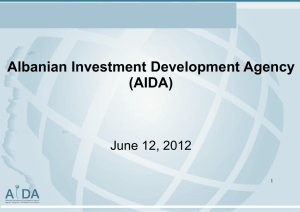Rose F. Kennedy Intellectual and Developmental Disabilities
advertisement
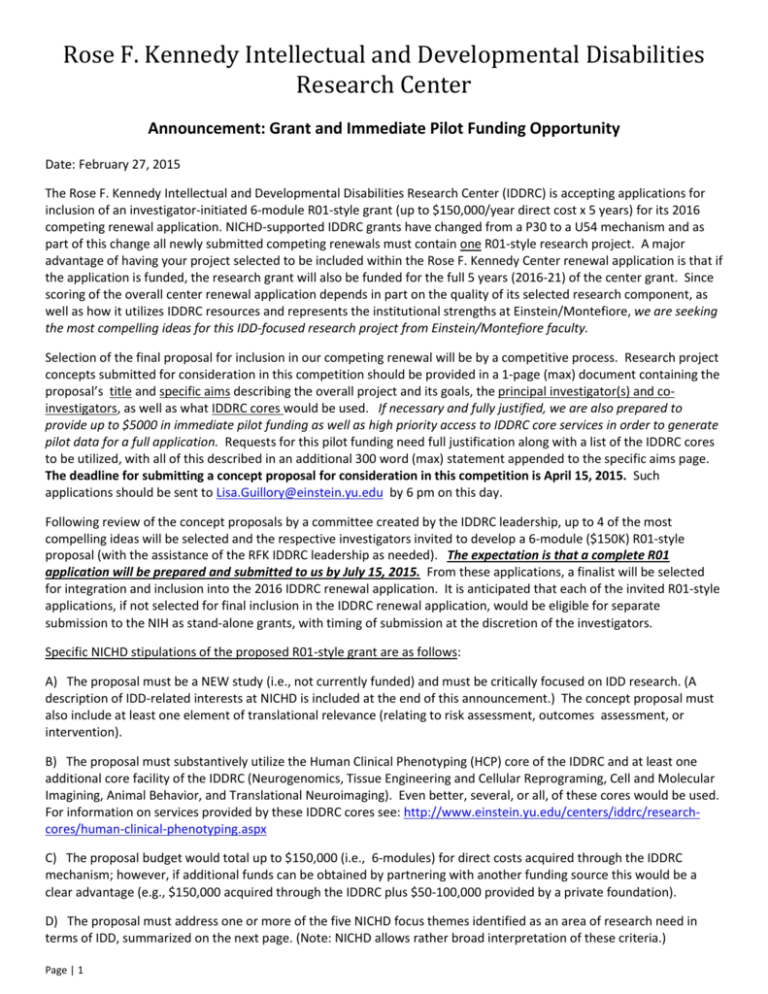
Rose F. Kennedy Intellectual and Developmental Disabilities Research Center Announcement: Grant and Immediate Pilot Funding Opportunity Date: February 27, 2015 The Rose F. Kennedy Intellectual and Developmental Disabilities Research Center (IDDRC) is accepting applications for inclusion of an investigator-initiated 6-module R01-style grant (up to $150,000/year direct cost x 5 years) for its 2016 competing renewal application. NICHD-supported IDDRC grants have changed from a P30 to a U54 mechanism and as part of this change all newly submitted competing renewals must contain one R01-style research project. A major advantage of having your project selected to be included within the Rose F. Kennedy Center renewal application is that if the application is funded, the research grant will also be funded for the full 5 years (2016-21) of the center grant. Since scoring of the overall center renewal application depends in part on the quality of its selected research component, as well as how it utilizes IDDRC resources and represents the institutional strengths at Einstein/Montefiore, we are seeking the most compelling ideas for this IDD-focused research project from Einstein/Montefiore faculty. Selection of the final proposal for inclusion in our competing renewal will be by a competitive process. Research project concepts submitted for consideration in this competition should be provided in a 1-page (max) document containing the proposal’s title and specific aims describing the overall project and its goals, the principal investigator(s) and coinvestigators, as well as what IDDRC cores would be used. If necessary and fully justified, we are also prepared to provide up to $5000 in immediate pilot funding as well as high priority access to IDDRC core services in order to generate pilot data for a full application. Requests for this pilot funding need full justification along with a list of the IDDRC cores to be utilized, with all of this described in an additional 300 word (max) statement appended to the specific aims page. The deadline for submitting a concept proposal for consideration in this competition is April 15, 2015. Such applications should be sent to Lisa.Guillory@einstein.yu.edu by 6 pm on this day. Following review of the concept proposals by a committee created by the IDDRC leadership, up to 4 of the most compelling ideas will be selected and the respective investigators invited to develop a 6-module ($150K) R01-style proposal (with the assistance of the RFK IDDRC leadership as needed). The expectation is that a complete R01 application will be prepared and submitted to us by July 15, 2015. From these applications, a finalist will be selected for integration and inclusion into the 2016 IDDRC renewal application. It is anticipated that each of the invited R01-style applications, if not selected for final inclusion in the IDDRC renewal application, would be eligible for separate submission to the NIH as stand-alone grants, with timing of submission at the discretion of the investigators. Specific NICHD stipulations of the proposed R01-style grant are as follows: A) The proposal must be a NEW study (i.e., not currently funded) and must be critically focused on IDD research. (A description of IDD-related interests at NICHD is included at the end of this announcement.) The concept proposal must also include at least one element of translational relevance (relating to risk assessment, outcomes assessment, or intervention). B) The proposal must substantively utilize the Human Clinical Phenotyping (HCP) core of the IDDRC and at least one additional core facility of the IDDRC (Neurogenomics, Tissue Engineering and Cellular Reprograming, Cell and Molecular Imagining, Animal Behavior, and Translational Neuroimaging). Even better, several, or all, of these cores would be used. For information on services provided by these IDDRC cores see: http://www.einstein.yu.edu/centers/iddrc/researchcores/human-clinical-phenotyping.aspx C) The proposal budget would total up to $150,000 (i.e., 6-modules) for direct costs acquired through the IDDRC mechanism; however, if additional funds can be obtained by partnering with another funding source this would be a clear advantage (e.g., $150,000 acquired through the IDDRC plus $50-100,000 provided by a private foundation). D) The proposal must address one or more of the five NICHD focus themes identified as an area of research need in terms of IDD, summarized on the next page. (Note: NICHD allows rather broad interpretation of these criteria.) Page | 1 NICHD Criteria for Inclusion for Research Projects within U54 Center Grants: (1) Comprehensive –omic Approaches Comprehensive -omic approaches (e.g., genomic, transcriptomic, epigenomic, metabolomic) that will markedly increase our understanding of IDD conditions with no known etiology or IDD conditions with complex etiologies to improve diagnosis, and potentially, treatment. Examples include, but are not limited to: • whole exome or whole genome sequencing of a well-defined cohort of subjects with IDD to identify genetic or genomic variants likely to cause the phenotype; • methylation or other studies on individuals with a shared IDD diagnosis but variable manifestations (such as range of cognitive function) to identify potential epigenetic contributors; • tandem mass spectrometry on biological samples such as saliva, blood or urine from a group of individuals with metabolic or other disorders associated with intellectual disability that might define distinctive biomarkers or metabolic signatures that would allow monitoring of outcomes or response to treatment. (2) Outcome Measures for Interventions or Treatments Development of preclinical or clinical outcome measures or biomarkers for the cognitive and/or behavioral phenotypes of IDD that have the potential to demonstrate a change in response to intervention or treatment. Examples include, but are not limited to: • development of a measure for an animal model (e.g., mouse, rat, nonhuman primate) of an IDD disorder that reliably detects changes in behavior response to a drug treatment; • development of a measure of cognitive function in individuals with an IDD that is sensitive to an intervention; • demonstration of changes in an existing behavioral measure in individuals with an IDD condition in response to therapy. (3) Multi-modal Treatment Approaches Development of bi- or multi-modal treatment approaches for a single IDD condition or a group of IDD conditions or spectrum disorders to demonstrate combinatorial effects to ameliorate a cognitive or behavioral symptom(s) of the condition(s). The interventions may or may not be disease-specific, and the potential to broaden to multiple IDD disorders is encouraged. Examples include, but are not limited to: • use of a drug and a training paradigm in an IDD animal model to demonstrate improvement in a behavioral measure; • use of a medication and behavioral treatment in combination for individuals with an IDD condition to demonstrate improved efficacy; • use of one well-established intervention plus 1-2 medications to improve general symptoms of a mood disorder in individuals with different IDD conditions who share that mood disorder. (4) Shared Resources across IDDRCs for Treatment or Assessment Development of an assessment battery or clinical intervention for an IDD condition or group of IDD conditions that links more than one funded IDDRC into a network, with sharing of at least one unique core resource from each IDDRC. Examples include, but are not limited to: • development of an assessment paradigm for an allelic series of animal models for an IDD condition that uses the genomics core of one IDDRC and the animal behavioral core of another IDDRC; • development of a testing paradigm for a specific IDD condition that uses the biostatistics core from one IDDRC and the human behavioral assessment core of another IDDRC; • creation of a clinical trial for an IDD condition that utilizes the patient recruitment core from one IDDRC and the trial design core from another IDDRC. (5) Public Health Approaches Public health approaches to IDD that identify potentially preventable, modifiable, or treatable targets that can yield a rich payoff in ameliorating or improving outcomes for large groups of individuals with IDD or that will reduce risk of developing an IDD. These may include preconceptional, prenatal, postnatal or childhood exposures or risk factors, and may involve the broader family or community. Examples include, but are not limited to: • a project that addresses the risk of developing an IDD due to preterm birth; • a project that addresses maternal exposures to potential teratogens (alcohol, cocaine, cytomegalovirus, etc.) Page | 2 Intellectual and Developmental Disabilities Branch at NICHD: Background information The IDD branch at NICHD, formerly the Mental Retardation and Developmental Disabilities Branch, sponsors research and research training aimed at preventing and ameliorating intellectual and related developmental disabilities. The IDD Branch has a longstanding history of providing support for a diverse portfolio of research projects, training programs, and research centers dedicated to promoting the well-being of individuals with intellectual and developmental disabilities. When the Institute was created at the NIH in 1962 at the request of then-President John F. Kennedy and with the support of congress, one if its primary charges was to encourage investigations in human development throughout the lifespan, with an emphasis on understanding IDDs. The mission of the IDD Branch at NICHD is to: • Develop and support research and research training programs in IDDs, including common and rare neuromuscular and neurodevelopmental disorders, such as Down, Fragile X, and Rett syndromes, inborn errors of metabolism, autism spectrum disorders, and others; • Promote studies designed to understand the etiology and pathophysiology of abnormal nervous system development and to delineate genetic, genomic, and epigenetic bases of IDD; • Support research designed to examine the screening, diagnosis, treatment, and management of IDD and other conditions identified by newborn screening or other screening methods; • Promote multidisciplinary and translational research in IDD through programs that integrate basic and applied research, training, and service activities for those with IDD and their families; • Collaborate with other federal agencies, organizations, and advocacy groups to advance efforts toward the prevention and diagnosis of IDD as well as early intervention and treatment for these conditions. Areas of research for investigators at IDDRCs include (but are not limited to) studies of: • Chromosomal conditions that cause IDD, such as Prader-Willi syndrome, Angelman syndrome, Williams syndrome, and Down syndrome; • Conditions identified by newborn screening associated with cognitive impairment; • Other conditions that are characterized by IDD; • X-chromosome disorders, such as Rett syndrome and Fragile X syndrome, that result in IDD; • Disorders that involve biochemical processes and metabolic issues related to brain functioning, brain injury, or longterm consequences to the brain, such as hypoxia, very low birth weight, Phenylketonuria, and prenatal malnutrition; and • Biological or biochemical mechanisms that cause behavioral problems, such as those found in autism spectrum disorders, self-injurious behavior, and impairments in language development. DEADLINES and Important Dates Associated with this Announcement: 1-page concept proposal: Overall description of the study with its Specific Aims, PI(s) and co-I(s), and IDDRC cores to be used. If needed, include an additional (separate) 300-word justification for access to up to $5000 in pilot funds to support the proposal development – DUE April 15, 2015 Notification of up to 4 proposals for R01 preparation and, if fully justified, immediate pilot funding of $5000 and/or prioritized IDDRC core access – May 1, 2015 Completed R01-style proposals (with up to a $150,000 budget, or higher if additional foundation, etc. funding is available) – DUE July 15, 2015 Announcement of selection of the one proposal to be included in the IDDRC competing renewal – August, 2015 Draft IDDRC U54 grant application, including the research project component, completed – October, 2015 Anticipated NIH U54 IDDRC Grant Application due date – January, 2016 Questions about this grant solicitation should be first directed to Lisa Guillory, IDDRC Administrator, at Lisa.Guillory@einstein.yu.edu or phone: 718-430-3787 Page | 3
